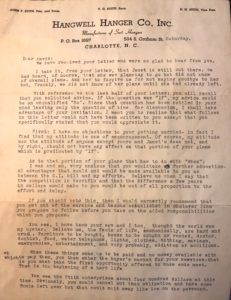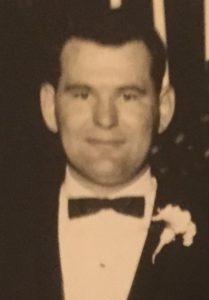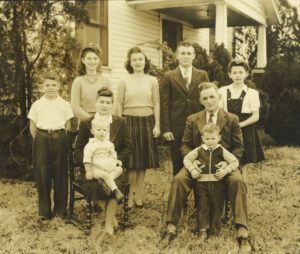I can’t tell you how surprised I was when Brother Dave showed me the letter Dad wrote him in 1958 or ’59, when Dave was in the Navy, stationed aboard USS Ajax (AR-6). Dad was not a letter writer.

I’ve posted 22 stories about my father and those of you who have read some of them know that he was not a regular guy. Just so the rest of you know, his first name was “Sir.”
In 1906, when Dad was 10 years old, his father committed suicide – shot himself. In 1909, when Dad finished the 7th grade, he dropped out of school, went to work, and began paying his own way. After that he got his education from the local newspaper, The World Almanac, and the School of Hard Knocks.
I only know of four other letters Dad wrote, two to my mother in the late 1920’s, urging her to come back to him; one to Brother John during WWII, when John needed money to come home on leave; and one to The Charlotte News, which was published, correcting an error in the paper and explaining to the editor how to accurately compare the strength of earthquakes. John said the only letter Dad ever wrote him contained a cashiers check and six words: “Dear Mike, Roger Wilco. Love, Dad.”
That’s it, as far as I know.
John F. Stith Sr. wasn’t one to express his feelings in writing or otherwise. He was not the kind of father who remembered our birthdays, if you know what I mean. He was a hard working man who couldn’t stand prosperity — or tolerate insult. Brother John said he lost interest in successful ventures. And, by all accounts, he liked to fight, with his fists or brass knuckles or a blackjack.
That’s why his letter to Dave was so surprising to me. It revealed a side of him I never saw in person – regret. And a longing for easier, more prosperous, lives for his children.

Dave had written to Dad, told him that he planned to marry his high school sweetheart, and asked for advice about timing. This was our father’s response:
Dear David,
“We have received your letter and were so glad to hear from you.”
…“With reference to the last half of your letter: you will recall that you solicited advice. If the question was ‘If’ [you should marry], my advice would be an unqualified ‘No’. Since that question has been settled in your mind leaving only the question of time for discussion, I shall take advantage of your invitation. I want you to realize that what follows in this letter would not have been written to you except that you specifically stated that you would appreciate it.”
“First: I have no objections to your getting married – in fact I find that my attitude is one of encouragement. Of course, my attitude nor the attitude of anyone except yours and Janet’s does not, and by right, should not have any effect on that portion or your plans which is predicated by ‘If’.”
“As to that portion of your plans that has to do with ‘When’:”
“I was and am, very anxious that you would take further educational advantages that could and would be made available to you as between the G.I. Bill and my efforts. Believe me when I say that the competition is terrific and that the difference a few years in college would make to you would be out of all proportion to the effort and delay.”
“If you should veto this, then I would earnestly recommend that you get out of the service and become established in whatever line you proposed to follow before you take on the added responsibilities which you propose.”
“You see, I have been your age and I too, thought the world was my oyster. Believe me, the facts of life, economically, are hard and cruel. Furniture to be bought, house to be bought or rented, doctor, dentist, food, water, telephone, lights, clothes, tithing, savings, emergencies, entertainment, and very probably, addition or additions.”
“When these things come up to be paid and no money available with which to pay them, you then enter the buyer’s market for your services – that is you must take the first opportunity offered to make ends meet. That is the beginning of a hard life.”
“Let’s examine a few case histories:”
“Mike: [He was our oldest brother; his wife, Mary, was a registered nurse.] This boy has a great deal on the ball, the same as yourself. However, during his married life there have been times that if Mary had not had an earning capacity somewhat above the average and been willing to call on that earning capacity, they would have found it extremely difficult to make ends meet. Even so, they have had to put a patch on the ends to make them meet on several occasions.”
“Jane: [John Greer was Sister Jane’s husband.] John Greer is a citizen of the first water. Due to lack of formal education his earning capacity has been and is limited. He has stickability and is now doing somewhat better than he had done. But in the meantime, Jane has sewn and patched to augment their income and both have done without things they were entitled to in order that what they both could earn would be barely enough to do the things that had to be done.”
“Pop: [Pop, another brother, worked at Goodyear, building tires.] He is now out on strike. When he is working he makes fairly good wages. Jean is one of the best secretaries I have ever known and it takes their combined efforts to make the wheel go round. Here again, lack of enough education rears it’s ugly head.”
“Tom: [Sister Alene, whose nickname was “Tom,” was married to Jack Lambert.”] Jack finished at Auburn and they are doing alright for themselves. Of course, Jack is in the service but plans to resign and has in his possession several flattering offers of employment as a civilian.”

“Your father: I have had soda water stand, worked in a grocery store, carried papers, work on telephone exchange, waited on table in a restaurant, delivered parcels, worked in news stand, served in Army, sold candy, fought semi-professionally, put on lathes, worked in a machine shop, hauled coal, dug coal, dug and loaded ore, loaded chert with hand shovel, was conductor on street car, made flags, made mops, ran grocery store, sold pickles, built forms for concrete, made syrup, made coat hangers, prepared loopers, gambled, been in debt, been hungry, cut and delivered stove wood, reclaimed iron, built roads, loaded dirt, built houses, sold books, etc. etc. etc.”
[And that’s not all. According to a book Brother John wrote in the 1980’s about his life and times Dad made a fountain syrup during World War II called “Bob’s Cola,” used by drug stores as a substitute for Coca Cola.
“Pappy was an excellent money-maker, but he was a very bad long-term businessman. In those days he made money faster than the mint, but I challenge anyone to find where it went.”
Dad also left out several jobs I knew about. When I was a boy he was a chicken farmer and, later, he had a dairy. He raised cotton. He bottled vinegar. He lost his shirt when he opened a weave shop. And he was a landlord, with two rental houses. He told me he was a cabinet maker when he married my mother and, at one point, he tore down houses for a living. At the end of his life he became a rag man, and made a ton of money. Say what you will, the man was not lazy.]
“If I had taken advantage of educational advantages that I am sure could have been arranged, I would now be a retired doctor instead of being down here on Saturday getting machines repaired in order to run on Monday and in my greasy dirty overalls working like a [Afro-American] is supposed to work in order to make a living. Now bear in mind that when we came up to Charlotte some six or seven years ago we owed money to every living soul that would credit us. Your mother sold Tupperware, gave lectures [on flower arranging, she was a flower judge] and sewed for her neighbors to help pay off these obligations. Now, at almost 65 years old, I can see the other end of the my row, but that is a mighty long time to wait considering I could have done in a few years at the beginning what it has taken me almost fifty years to do.”
[Actually he didn’t make it to Easy Street until he was 68, after his plant burned.]
…“In the last analysis, the decision both as to the ‘If’ and the ‘When’ is for you and Janet to make. I only hope that this letter will make some little contribution toward a sane and satisfactory decision.”
“Am glad you youngsters are enjoying each other. Give my best to Janet and convey to her that when the time comes, she will be a welcome addition to the Stith Clan.”
“We all send you both our love.”
/s/Dad
Postscript:
None of the seven children by my mother followed Dad’s path.
***Marge, our oldest sister, wasn’t mentioned in Dad’s letter for some reason. She went back to school, earned a PhD in child psychology from Florida State University, and taught at Kansas State University until her retirement.
***Brother John went back to school, to the University of Alabama, earned a degree in industrial engineering, and worked until his retirement for Tennessee Eastman.
***John Greer worked for Gadsden Hardware until his death at 63. Sister Jane, who is 92 now, still sews for money — and the joy of it.
***Jack Lambert, recalled by the Air Force, was a colonel when he retired. Alene, who had dropped out of Auburn University to marry Jack, went back to school while he was in Vietnam, earned a degree from the University of Alabama, and taught school until she retired.
***Pop worked for Goodyear for 33 years, until his retirement.
***Dave did not marry his high school sweetheart and did not graduate from college. He did find his life’s work, manufacturing corrugated boxes, before he married. Shortly after he married he started his own business, Queen City Container Corp., a sheet plant he ran for 38 years and then sold.
***I was not mentioned in Dad’s letter, I was still in high school. I graduated from the University of North Carolina at Chapel Hill and was a newspaperman for 42 years.
Coming Friday: The Weekend From Hell
I enjoyed the insight into my grandfather by way of the letter.So few of them exist. I know,because I only have two,and one of them does deal with his feelings.For the sake of the record they should be posted and I will transcribe them and e mail them to you.
At last! Public acknowledgment that you’ve been holding out on me, Steve. How about a photocopy?